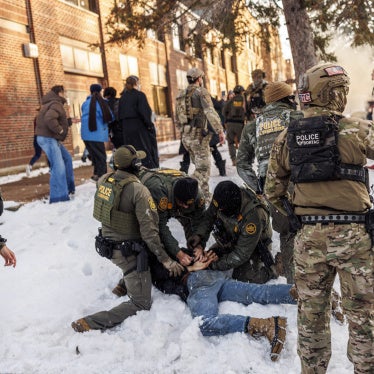When John D. Negroponte goes before the Senate Intelligence Committee today for hearings on his nomination to be the first Director of National Intelligence, he should face rigorous questioning regarding his experience as ambassador to Honduras in the 1980s. These questions are needed, not to relive past policy debates, but rather to determine how ready he is to handle one of the most pressing challenges he’ll confront as national intelligence director.
Negroponte served in Honduras from 1981 to 1985, when the Honduran security forces were implicated in the abduction, torture, and murder of scores of people. Despite these abuses, the country was receiving millions of dollars of U.S. military aid, training and operational support, and glowing reports on its commitment to the rule of law from the U.S. government. The State Department reported in 1983, for example, that the "Honduran government neither condones nor knowingly permits killings of a political or nonpolitical nature." And Negroponte himself wrote in a 1982 letter to The Economist that “it is simply untrue to state that death squads have made their appearance in Honduras," while omitting any mention of the abuses that were in fact taking place.
Asked about these statements at his 2001 confirmation hearing for the U.N. ambassadorship, Negroponte insisted they were literally true—the abuses did not fit his definition of “death squad activity” and were not “part of a deliberate government policy.” What he chose not to acknowledge was the fact that the CIA, the Inter-American Court of Human Rights, and the Honduran Human Rights Ombudsman have all concluded that the Honduran security forces either carried out or condoned these abductions and killings. Does that mean he thinks the CIA, the court, and the ombudsman all got it wrong?
Negroponte also insisted in 2001 that his embassy had been entirely forthcoming about the human rights situation in Honduras. He conceded, however, that they had lacked extensive information on abuses, not because of intentional neglect, but because investigating them “was not one of the intelligence reporting priorities” at the time. In retrospect, doesn’t he think it should have been a top priority?
Finally, Negroponte responded to questions about human rights in Honduras by drawing attention to the national security threats that the country had faced at the time. He had done the same in the 1980s when human rights violators in Honduras, and throughout the region, were using national security threats to justify the most egregious forms of repression. Does that mean that he too thinks that those threats made the abuses less reprehensible?
These questions are not merely academic. Today the United States is once again collaborating with foreign intelligence and security agencies that engage in torture and other abuses. Where in the past, the United States trained and funded abusive security forces, now it has been actively transferring, or “rendering,” terrorist suspects to countries, such as Syria and Saudi Arabia, where torture is commonplace.
Today, moreover, the United States has once again failed to investigate alleged abuses in a thorough and timely fashion. The incidents of torture at Abu Ghraib could have been avoided if the administration had carried out serious investigations into the prisoner abuse allegations that arose in Afghanistan in 2002, and later in Iraq. Even after ordering multiple investigations of what went wrong there, the administration has failed to give investigators the mandate or independence necessary to determine how decisions made at the top contributed to those abuses—and could contribute to future ones.
And today, serious abuses are once again being justified on national security grounds—in some cases by US officials. While the administration has publicly repudiated torture since the Abu Ghraib scandal, it continues to assert its right to engage in forms of prisoner abuse that violate established U.S. military regulations, as well as international law.
The inhumane treatment of detainees—caught on film at Abu Ghraib—has dealt a major blow to American credibility worldwide. And the willingness to tolerate abusive practices in the name of national security has set a dangerous example for repressive regimes around the globe. As we saw in Honduras twenty years ago, when it comes to torture, murder and other egregious abuses, anything less than zero tolerance sends the wrong message.
For the United States to restore its credibility on human rights today, it needs a national intelligence director who will set a new course. To be confirmed, Negroponte should show that he’s learned the lesson of Honduras.
Daniel Wilkinson is counsel for the Americas Division of Human Rights Watch.







